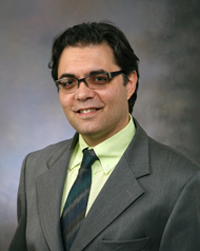Recently, University of Florida Department of Pathology, Immunology and Laboratory Medicine Associate Professor and Researcher Marco Salemi, Ph.D., was awarded a grant from the Florida Department of Health for a project titled, “Whole Genome Sequencing of Neisseria meningitidis serogroup W135 Isolates Belonging to a Clone Emerging in Florida.” The grant was awarded so Dr. Salemi and his team can study infections in Florida, such as Neisseria meningitidis (or meningococcus), a bacterium that can cause meningitis and other forms of meningococcal disease, including the life-threatening sepsis, meningococcemia.
N. meningitidis is a major cause of illness and death during childhood in industrialized countries. Dr. Salemi and his team will characterize the genetic diversity of the bacterial strains circulating in Florida, which is essential information for the Department of Health to be able to develop prevention and intervention campaign state-wide.
Dr. Salemi and some of his colleagues (M. M Norström, Nazle M. Veras, W. Huang, M. C. F. Prosperi, J. Cook, W. Hartogensis, F. M. Hecht, A. C. Karlsson) are also having their paper, “Baseline CD4+ T cell counts correlates with HIV-1 synonymous rate in HLA-B*5701 subjects with different risk of disease progression,” published in an upcoming issue of PLOS Computational Biology, the official peer-reviewed journal of the International Society for Computational Biology (ISCB) and one of the top journals in the study of bioinformatics.
The following paragraph is excerpted from the paper:


